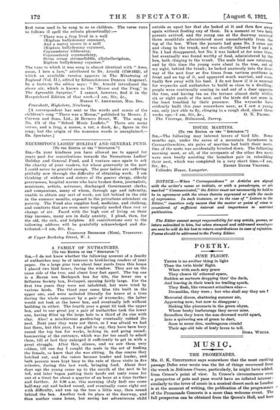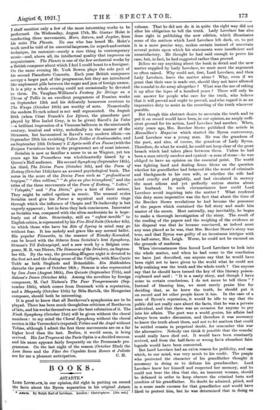MUSIC.
THE PROMENADES.
MR. G. K. CIIRSTERTON says somewhere that the most exciting passage Defoe ever wrote was the list of things recovered from the wreck in Robinson Cruage, particularly, he might have added, from Crusoe's point of view. In Crusoe's circumstances even a prospectus of pots and pans would have an inflated interest: similarly to the lover of music in a musical desert such as London is at the moment of writing, the publication of the programme° of the Promenade Concerts is a more than welcome event. The full prospectus can be obtained from the Queen's Hall, and here I shall• mention only a few of the more interesting- works to be performed. On Wednesday, August 17th, Mr. Gustav Hoist is conducting three movements, Mars, Saturn, and Jupiter, from his suite The Planets. No one who has heard Mr. Hoist's work need be told of its essential largeness, its superb and certain technique, its restraint—surely a rare thing in contemporary music—and, above all, its intellectual quality that improves on acquaintance. The Planets is one of the few orchestral works by a British composer about which I feel I could boast to a foreigner. On the same evening Mr. York Bowen plays the solo part of his second Pianoforte Concerto. Each year British composers occupy a larger part of the programme, but they are introduced like unpleasant pills between the sugar and jam of foreign names. It is a pity a whole evening could not occasionally be devoted to them. Dr. Vaughan-Williams's Fantasy for Strings on a Theme of Tallis in an excellent programme of Russian works on September 13th and his delicately humorous overture to The Wasps (October 10th) are worthy of note. Numerically the modern Fraich school is not well represented. On August 20th (when Cesar Franck's Les Djinns, the pianoforte part played by Miss Isabel Gray, is to be given) Ravel's La Valse —a brilliant impression of a Viennese ballroom in the nineteenth century, ironical and witty, melodically in the manner of the Strausses, but harmonized in Ravel's very modern idiom—on September 29th his ravishing Valses Nobles et Bentimentales, and on September 15th Debussy's L'Apres-midi d'un Faune (with the Enigma Variations later in the programme) are of most interest.
Scriabin is now as familiar a name to us as Wagner, yet ten years ago his Prometheus was wholeheartedly hissed by a Queen's Hall audience. His second Symphony (September 14th), his third, The Divine Poem (October 5th), and the Poem of Ecstasy (October 11th) have an avowed psychological basis. The notes in the score of the Divine Poem such as "prefondement tragigue," " élan sublime," " de plus en plus triomphant," and the titles of the three movements of the Poem of Ecstasy, " Luttes," " Voluptes," and " Feu Divin," give a hint of their nature. They might be called egotism in music. The unusual scales Scriabin used give his Poems a mystical and exotic tinge through which the influence of Chopin and Trohaikovsky is but vaguely apparent ; but in form they lack conciseness. Innovator as Scriabin was, compared with the ultra-modernists he is hope- lessly out of date. Stravinsky, still an " enfant-terrible" to English critics, is represented by his Fire-Bird Suite (October 4th), to which those- who have his Rite of Spring in mind may go without fear. It has melody and grace like any normal ballet. His popular Fireworks, in the manner of Rimsky-Korsakof, can be heard with the Scherzo from Scriabin's first Symphony, Strauss's Til Eulen.spiegel, and a new work by a Belgian com- poser, M. B. van Dieren, The Discourse of the Drinkers, on Septem- ber 6th. By the way, the preceding.Wagner night is devoted to the first act and the closing scene of the Valkyrie, with Miss Carrie Tubb as both Sieglinde and Brannhilde. Ein Heldenleben disturbs the peace of October 18th ; Strauss is also represented by Don Juan (August 16th), Don Quixote (September 27th), and Salome' Dance (October 4th). Among the novelties by foreign composers, M. Carl Nielsen's The Four Temperaments (Sep- tember 13th), which comes from Denmark with a reputation, and a Rhapsody (October 15th) by Bela-Bartok, the Hungarian composer, should both be interesting.
It is good to know that all Beethoven's symphonies are to be played. There has been much thoughtless criticism of Beethoven of late, and his works themselves are the best refutation of it. The
Ninth Symphony (October 21st) will be given without the choral numbers : to my mind the Choral Symphony without the choral section is like Verrocchio's (reputed) Tobias and the Angel without
Tobias, although I admit the first three movements are on a far higher level than the last. Berlioz, it would seem, is being
revived. His Lett Troyenz at the Paris Opera is a decided success, and his name appears fairly frequently on the Promenade pro- grammes. On the last night of the season (October 22nd) the Love Scene and the Hies des Capulets from Romeo et Juliette



































 Previous page
Previous page